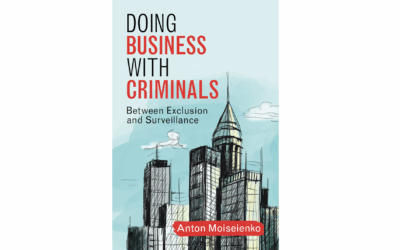Information Law and Policy Centre
The Information Law and Policy Centre (ILPC), based at the Institute of Advanced Legal Studies (University of London), launched in spring 2015. The Centre’s mission is to undertake, promote, and facilitate, cross-disciplinary scholarship and research in the area of information law and policy, domestically and internationally, in collaboration with a variety of organisations within the public and private sectors, and civil society.
The work for the Centre is led by its Academic Director, Dr Nóra Ni Loideain.
Book Launch Event – Privacy and Crime: Financial Surveillance and Civil Liberties
Date: 16 September 2025, 5:30PM – 6:30PM
Since the early 1990s, the global approach to financial privacy has changed beyond recognition. All our financial transactions, no matter how trivial or significant, are subject to surveillance by banks and other regulated businesses, such as accountants and lawyers.
These rules are meant to preclude criminal exploitation of the legitimate economy, but their effectiveness and value for money have long been questioned. They are also associated with serious unintended consequences, such as wholesale ‘de-risking’ of higher-risk customers or industries.
In Doing Business with Criminals: Between Exclusion and Surveillance (Cambridge University Press 2025), Dr Anton Moiseienko traces the history of financial surveillance as a core component of the global anti-money laundering and counter-terrorist financing regime.
This online event will feature discussion of some of the book’s key themes, including the inherent contradiction at the heart of the regime, namely the tension between excluding criminals from the legitimate economy and surveillance of their financial activities.
This event is free to attend, but booking is required.
For futher details and registration, click here.
Blog
ILPC Annual Lecture 2025
The Information Law & Policy Centre is delighted to announce that this year’s Annual Lecture 2025 will be delivered by Dr Brian Plastow, the Scottish Biometrics Commissioner, entitled: ‘Biometrics and policing: The benefits and risks of AI for law enforcement and...
Privacy and Crime: Financial Surveillance and Civil Liberties
Date: 16 September 2025, 5:30PM - 6:30PM Since the early 1990s, the global approach to financial privacy has changed beyond recognition. All our financial transactions, no matter how trivial or significant, are subject to surveillance by banks and other regulated...
Call for Papers: ILPC Annual Conference 2025
CALL FOR PAPERS ILPC Annual Conference 2025 Regulating AI in a Changing World: Oversight and Enforcement We are pleased to announce this call for papers for the Information Law and Policy Centre’s 10th Annual Conference on 20-21 November 2025 hosted by the Institute...
Current Developments
- ‘NHS data breach: trusts shared patient details with Facebook without consent’. The Information Commissioner’s Office (ICO) is investigating, The Guardian (27 May 2023).
- ‘Rishi Sunak races to tighten rules for AI amid fears of existential risk’, The Guardian (26 May 2023).
- ‘Meta’s fine has repercussions for EU-US data flows’, Financial Times (25 May 2023).
- ‘OpenAI warns over split with Europe as regulation advances’, Financial Times (25 May 2023).
- ‘Ministers looking at body-worn facial recognition technology for police’, The Guardian (16 May 2023).
ILPC Seminar Series 2022
Spotlight Series
It is a Long Way to… E-Evidence: EU Reforms in the Collection of Electronic Evidence Part 2 – The Role of Service Providers
Author: Marine Corhay On 25 January 2023, the Council of the EU confirmed an agreement with the European Parliament has been reached on both the draft regulation and the draft directive on cross-border access to e-evidence. The first part of this article...
It is a Long Way to … E-Evidence: EU Reforms in the Collection of Electronic Evidence – Part 1
Author: Marine Corhay In November 2022, the Commission announced that a political agreement between the European Parliament and the Council had been reached to strengthen cross-border access to digital evidence. The announcement comes after more than four years...
Is Technology the Answer to Addressing the Legal Needs of Vulnerable Social Groups during the COVID-19 Pandemic? – Faith Gordon, Jess Mant and Daniel Newman
The COVID-19 pandemic ‘is making inequalities more visible’, according to the UNODC. This also is the view of those working in law centres at the grassroots. As the Law Centres Network chair, Helen Rogers points out: “The pandemic’s uneven impact is a grim reminder...





